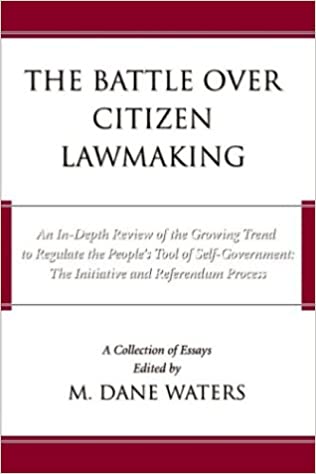
Dennis Polhill contributed to The Battle over Citizen Lawmaking: A Collection of Essays, authoring Chapter One: Democracy’s Journey (original version of Democracy’s Journey prior to editing).
From the Publisher:
There is little doubt that in recent years the initiative process has become one of the most important mechanisms for altering and influencing public policy at every level of government. In the last two years alone, utilizing the initiative process, citizens were heard on affirmative action, educational reform, term limits, tax reform, campaign finance reform, animal protection, drug policy reform, and the environment.
However, the initiative process has fallen prey to its own success. Lawmakers who have been most affected by this citizen’s tool have struck back by imposing new regulations on the process — regulations that serve no purpose but to deprive the citizens of the only avenue available to them to reign in unresponsive government.
These regulations have generated many questions that have so far remained unanswered or have been discussed only in specialist journals. There are legal questions about signature gathering and limits on campaign spending, political questions about implementing the relevant statutes, and philosophical questions about equality and freedom of expression. The Battle Over Citizen Lawmaking discusses the evolution of the initiative and referendum process, the need for the process, how it has been utilized, the impetus for new regulations, the major regulations that have been imposed, the role the courts have played in regulating the initiative and referendum process, what role money plays, and how the process has been regulated in other countries. This book comprehensively addresses these issues from the viewpoint of leading scholars, opinion leaders, journalists, elected officials, activists, and attorneys.
“Dane Waters has done a commendable job in bringing a focus to an edited book project that provides a new perspective on the growing literature on direct democracy. The emphasis on a legal perspective may even help bring the topic to greater attention in classes on law and politics.”
– The Journal of Politics, February 2002